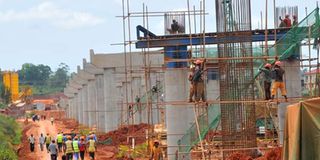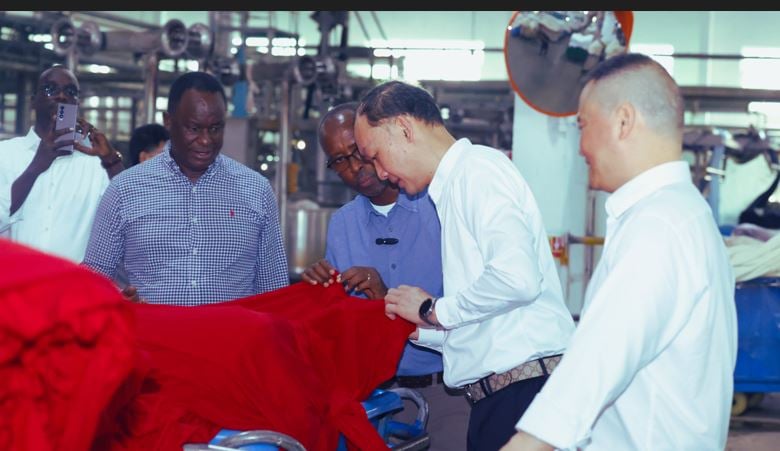Low activity reduces input prices in construction sector

Workers construct the Entebbe Southern bypass. The route is expected to ease traffic especially on Entebbe and Masaka Roads. Photo by Faiswal Kasirye
A slowdown of activity in the construction sector, coupled with competition has resulted in a fall in prices of construction materials.
The latest Uganda Bureau of Statistics Construction Sector Indices indicate that prices for cement, lime, diesel, iron sheets and other metal products dropped in the third quarter spanning June to September 2013 due to a contraction in demand and high competition between local imported products.
Property Developers Association president Anatoli Kamugisha attributed the slowdown in construction activities to low purchasing power among people who would be undertaking construction projects due to a shortage of money in circulation.
“Government is yet to pay most contractors and suppliers; so there is little money in circulation, people don’t have money to invest in new projects,” Mr Kamugisha who is also the managing director of Akright Projects told Prosper in an interview last week.
Due to reduced activity in the sector, Mr Kamugisha said manufacturers of construction sector inputs have been forced to charge relatively lower prices to keep afloat in the market.
The chief executive officer of the Association of Real Estate Agents in Uganda, Mr Vincent Agaba, also recently said that growth in the sector had stagnated due to a low basket of property buyers, attributed to shocks that affected the industry in the past including high inflation rates and the closure of the land registry to enable the Ministry of Lands to complete the automation exercise among others.
Meaning
The low cost of construction inputs means that people undertaking construction projects currently or in the last quarter paid less compared to the same period last year.
For instance, a bag of cement now costs Shs26,000, down from the Shs30,000 it cost between July and September last year.
Iron sheets, however, range from Shs26,000 to Shs55,000 depending on the gauge, make, colour and manufacturer, down from between Shs28,000 and Shs60,000 a year ago.
The fall in prices of prices of iron steel products including iron sheets was a result of competition in the iron and steel sector due to a fall in world steel prices, according to Mr William Anguyo, the principal statistician in charge of business and industry statistics at Ubos.
Cement production in the country has increased following the entry of new players such as Moroto Cement whose production capacity is estimated at 3,000 metric tonnes daily as well as an increase in production capacities of Hima and Tororo Cement factories, among others.
Cement supply in the country is currently estimated at 137,000 toness, up from 115,000 tonnes in 2012, according to Ubos. As cement production increases, prices are also expected to continue trending downwards.
The slowdown in construction sector activity and the fall in sector input prices saw inflation in the sector decline by 8.7 per cent in the third quarter this year compared to a similar quarter in 2012.
A stable local Shilling that made importation of raw materials used in manufacturing steel products also facilitated a fall in product prices.
Despite a fall in cement, lime, diesel and steel prices, charges for other construction materials including timber, PVC pipes, aggregates, equipment hire, concrete, tiles and burnt clay bricks remained fairly unchanged due to relatively stable market conditions, according to Mr John Bonaventure Musoke, senior statistician, Ubos.
The sector may, however, experience lower growth rates this year due to contraction in activities.




